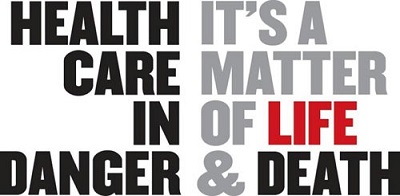Lack of access to health care is probably one of the biggest humanitarian issues today in terms of the numbers of people affected. Health Care in Danger (HCiD) is a global initiative launched by the ICRC to improve delivery and security of effective and impartial health care in armed conflict and other emergencies.
Background
In 2008, the ICRC launched a study to look at how violence affects the delivery of health care in 16 countries where it is operational. Reports of incidents were collected from a variety of sources, including health organizations, Red Cross and Red Crescent staff, and the media. The study has shown that violence against is a complex with multiple aspects ranging from direct attacks against health-care workers and facilities to obstruction of medical transport and general insecurity affecting access to health care.
Since the 31st International Conference of the Red Cross and Red Crescent, States, the International Red Cross and Red Crescent Movement (the Movement), the health-care community and civil society have mobilized around the Health Care in Danger project to take steps to address the issue of violence. In 2011, the ICRC launched the HCID project (Resolution 5, 31st International Conference).
However, in 2015, the issue was brought back to the 32nd International Conference, through a resolution and a plenary commission in order to encourage continued action, particularly at the national level, bearing in mind existing roles, mandates and capacities. The advocacy and awareness raising that have been a dominant feature over the past four years should now translate into practical measures informed by the substantial body of recommendations and emerging good practice.
The HCiD Project
The Project has identified four major problems leading to lack of safe access to health-care in conflict and other emergencies:
– Attacks against patients, health-care personnel and medical facilities, including killing and kidnapping;
– Obstructions of health-care delivery;
– Discrimination while providing healthcare;
– Armed disruption of health care services.
The project aims to:
– Raise awareness about and increase general understanding of the issue of violence against health care in conflict and other emergencies and its devastating effects;
– Mobilize relevant stakeholders in support of this global initiative;
– Identify and promote the implementation of measures to prevent, mitigate and respond to violence against health care.
What has been done:
– A global campaign (Life&Death) was launched in 2011
– Key stakeholders were mobilized to find practical solutions within their own spheres of responsibility
– ICRC delegations have started collecting and analyzing data on incidents affecting the delivery of and access to health care in armed conflict and other emergencies and reviewing their field practices to improve their response to violence against health care in their respective context.
Engaging with National Societies
As a Movement-wide project, National Societies are playing a central role in the project. The Project is supported by a Movement Reference Group; which is comprised of 27 National Societies, and the International Federation of Red Cross Red Crescent.
Now, there are 40 National Societies that are actively engaged in specific initiatives in their own country, often working together with national health associations and government representatives. These initiatives include implementing the Safer Access Framework, training health care professionals on the rights and responsibilities of health care personnel, public communication and awareness raising, translating HCID publications into their own language for dissemination, incorporating HCID into IHL training, and hosting roundtables and symposiums with stakeholders, including health care associations and authorities.
Partnership with the Iranian Red Crescent Society on HCiD
Between 2012 and 2014, 11 expert workshops were held worldwide in addition to consultations at the field level on nine (9) different thematic aspects related to the project. In that regard, the ICRC Tehran and the IRCS together held a thematic workshop in February 2013 with the subject of “National Society in Response to HCiD”. 13 National Societies as well as a representative of the Federation participated in this workshop.
The process of thematic workshops has resulted in more than 150 recommendations for the prevention, mitigation and response to violence against health care. Recommendations and practical measures are addressed to a variety of stakeholders, including legislators and state authorities, arm carriers, National Societies, health care workers, community and religious leaders.
In June 2015, the ICRC and the IRCS organized also organized a roundtable on “Responding to humanitarian challenges for the safe delivery of health care”, in which representatives of the Ministries of Foreign Affairs, Health, Defense and the Iranian Medical Council (IMC) as well as the National Societies of Afghanistan and Norway participated.
Publications
The Project has already released 3 publications in Farsi related to this project.


